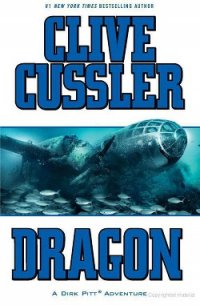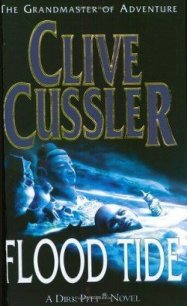Black Wind - Cussler Clive (книги полностью бесплатно txt) 📗
From the cockpit of the Icarus, Al, Dirk, and Jack watched with dread as the blast of the rocket shook across the open sea. Just seconds before, Giordino had eased the struggling airship down onto a flat clearing atop Santa Barbara Island, where the relieved Sea Launch crew quickly jumped out of the overcrowded gondola. Captain Chris-tiano hesitated at the cockpit doorway, stopping to shake hands.
“Thank you for saving my crew,” Christiano said through a grim face pained with disgrace for losing command of the Odyssey.
“Now that we can get airborne again, we'll make sure they don't get away,” Dirk replied with shared anger. He then pointed out the cockpit windshield toward an approaching blue dot on the horizon.
“The Deep Endeavor's on her way. Get your men down to the shoreline and prepare to transfer aboard.”
Christiano nodded then stepped off the gondola, leaving it empty save for Jack.
“All ashore,” he uttered into the cockpit.
“Then let's get this gasbag back into the sky,” Giordino grunted, turning the propeller ducts upward and advancing the throttles. With roughly eight thousand pounds of human cargo suddenly off-loaded, the blimp rose easily into the air. As Giordino aimed the airship back toward the Odyssey, their eyes collectively caught the first billows of smoke that indicated the launch was initiated.
The fuming exhaust of the burning liquid oxygen and kerosene propellant bursting against the platform's water dampener system created a massive white cloud of vapor that quickly enveloped the entire platform and surrounding sea. For what seemed like minutes, the Zenit stood still at the launch tower. To the men in the airship, there was a hopeful moment where it appeared that the rocket was not going to leave the pad, but finally the tall white rocket began to rise, its blinding exhaust glaring like a fireball. Even a half-dozen miles across the water, they could hear the sharp crackling sound of the combusting fuel as the hot explosive thrust met the cool surrounding air, creating the echo of an ax ripping through a pine log.
Though it was a powerful, almost beautiful sight, Dirk felt a sickening knot in his stomach as he watched the rocket ascend. The glistening white missile would host the most savage terrorist attack the world had ever seen, resulting in a horrifying death for millions. And he had failed to stop it. As if that was not punishment enough, he knew that Sarah was somewhere in the target area of Los Angeles and might very well be one of the strike's first victims. And then there was the fate of his father. Glancing forlornly at Giordino, he saw a grimace on the old Italian's face the likes of which he had never seen before. It was not a look of anger with the terrorists but an expression of concern for the loss of a lifelong friend. As much as Dirk did not want to face it, he knew that amid the noxious inferno of the rocket's blastoff his father was somewhere on the platform fighting for his survival, or worse.
Aboard the Deep Endeavor, Summer felt the same pangs of dread swell through her body. Dirk had radioed the ship with news that the Sea Launch crew had been rescued, but also that their father was somewhere aboard the platform. When Delgado was the first to observe the rocket igniting, she thought her legs had turned to rubber.
Grasping the captain's chair for support, she stared stoically toward the platform as tears welled in her eyes. All fell silent on the bridge around her as they watched in disbelief at the rocket as it surged off the launchpad. As one, their thoughts were on the fate of the NUMA leader, lost somewhere in the rocket's white plume of smoke. “It can't be,” Burch muttered in shock. “It just can't be.”
Inside the Badger, the temperature was unbearable. The superheated metal skin created a sauna effect with the water that was rising inside. Pitt could feel himself on the verge of passing out from the heat as he clawed his way back to the tilted pilot's seat. A handful of lights still blinked on the control panel, indicating that the emergency life-support system still had power, but the propulsion systems were long expired. Though his body was numb from the heat, his mind quickly calculated that he had one chance to break free from the grip of the pontoon. Through sweat-laden eyes, he reached forward and mashed a control button market ballast pump. Then, grasping the control yoke, he flung himself backward into the rising water, using his full weight and remaining strength to yank the sub's rudder against the burgeoning current. The rudder blade protested at first, then swung slowly against the rushing water, fighting against Pitt's every movement. With muscles aching and spots appearing before his eyes, Pitt clung desperately to the yoke, fighting not to pass out. For a second, nothing happened. All Pitt could hear was the churning torrent of the water rushing against the sub, while the temperature inside continued to rise. Then, almost imperceptibly, a grinding noise struck his ears. Gradually, the noise grew louder, matching the sound he had heard before. A faint smile crossed Pitt's lips as he fought to maintain consciousness. Hang on, he told himself, gripping the yoke tightly. Just hang on.
An eagle-eyed flight engineer, standing on a rocky hilltop of Santa Barbara Island amid his stunned Sea Launch colleagues, was the first to detect it. A subtle, almost invisible waggle at the base of the rocket as it cleared the launch tower.
“She's oscillating,” he said aloud.
His surrounding crewmates, exhausted and stunned by the entire ordeal, ignored his words and watched in angry disbelief as somebody else launched their rocket from their platform. But as the rocket climbed higher and higher into the sky, more of the experienced launch veterans detected something amiss with the flight trajectory. At first, just a murmur rippled through the assembled crew; then, an excited buzz jolted the men like an electric shock. One man started to yell, cursing at the rocket to burst, and then another followed suit. Before long, the entire crew was jumping up and down while shouting at the soaring rocket, cajoling the mechanical beast like some last-dollar bettors urging a long-shot nag to the wire at Pimlico.
On board the Koguryo, the excitement of the launch had yet to wane when a seated flight engineer turned to Ling and said, “Sir, the Stage One engine indicates an active gimbaling beyond nominal flight plan parameters.”
The Zenit-3SL, like most modern rockets, was steered in flight by adjusting, or gimbaling, the launch vehicle's engine, redirecting its thrust to govern the rocket's heading. As Ling was aware, the initial launch sequence called for no gimbaling until the rocket was in a stabilized climb, then the navigation system would initiate slight steering adjustments to guide the rocket toward the target. Only an undetected imbalance would create an immediate steering correction from launch.
Ling walked over to the engineer's station and peered at the man's computer monitor. His mouth fell open as he saw that the rocket's engine was gimbaled to its maximum degree. He watched in silence as, a second later, the engine adjusted back to its neutral position, then gimbaled to the full extent in the opposite direction. Almost immediately, the whole cycle started over again. Ling immediately surmised the cause.
“Choi, what was the launchpad horizontal deviation at T-0?” he shouted to the platform engineer.
The engineer looked back sheepishly at Ling and uttered in a barely audible voice, “Sixteen degrees.”
“No!” Ling gasped in a raspy voice as his eyes scrunched closed in a panic of disbelief. The color rushed from Ling's face and he felt himself grasping the computer monitor to steady his suddenly weakening knees. With dire foresight, he slowly opened his eyes and stared at the video screen of the charging rocket, waiting for the inevitable.




